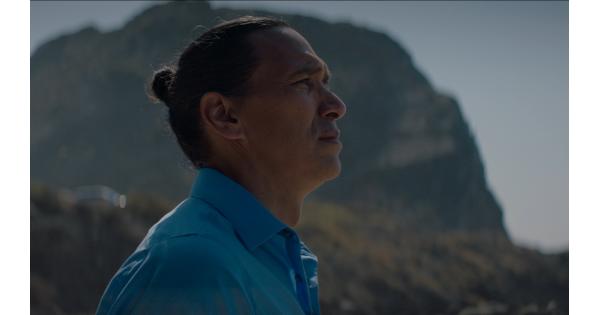
The one person you can never truly run from is yourself. Though many people have tried, our issues and past are always with us just as our shadows are. Wild Indian, a new debut feature film from indigenous writer/director Lyle Mitchell Corbine, Jr., explores this very phenomena.
The film’s central character Makwa, a young Anishinaabe boy (Phoenix Wilson), has a rough life. He often appears at school with bruises he says he got falling down, but no one believes him. He and his only friend, Ted-O (Julian Gopal), like to escape by playing in the woods, until the day Makwa shockingly murders a schoolmate. After covering up the crime, the two boys go on to live very different lives. As adult men, Makwa, now named Michael (Michael Greyeyes) and Ted-O (Chaske Spencer) must face the truth of what they have done and who and what they have become.
What’s most evident in this film and put directly at center stage is the endless cycle that is violence and the monsters it leaves in wake. This cycle is directly at the heart of all the films events. From the opening scene set centuries in the past, we see the domino effect that aggression and violence has on a community and the people who make it up, as the scene featuring an Ojibwe tribesman infected by colonial invaders of the past who sets off to die of this foreign disease alone and away from his people so as not to infect them is not only a story passed down from generation to generation as Corbine Jr. detailed in an interview, but a tone setter for one of the film’s themes. Violence affects more than just the assaulter(s) and victim(s) directly involved, but its ripple effects follows survivors, perpetrators, and their neighbors and progeny alike long after the deed is done. As an adult, Mak’wa has been able to assimilate into polite, Anglicized society, and even change his name, but his past haunts him nonetheless and eventually finds him, threatening the very façade he constructed to provide cover for his misdeeds in the first place. The lasting effects of the trauma from murdering a classmate has changed the two men in two entirely different ways. The ultimate takeaway from Wild Indian seems to be that the problems and issues that we attempt to bury deep within us aren’t extinguished in the dark, they only fester and rot, with the stench eventually becoming too strong to ignore.
But it’s not just the trauma experienced directly by Makwa and Ted-O that has affected them so deeply, as briefly depicted in its opening, it’s also the trauma faced by Indigenous people over the centuries and how that has impacted their respective identities. For Makwa, he hid his lasting trauma not only from the murder, but from his troubled youth, under the veneer of a well-adjusted family and career man, as many of us do in the real world, down to the Anglicizing of his name. He has done all of this not just to distance himself from what happened to him and what he did, but to remove his connections to his Native heritage as a whole and the shame of having descended from a conquered people. This distancing and reframing of who he is helps Michael in dealing with the fallout from his past, but Makwa carries the weight of erasing who he is on his spirit through the intense sociopathy and other issues he displays throughout the film. Ted-O’s lasting pain from his role in the murder and its coverup surfaced throughout his life in the most obvious ways as he became a career criminal covered in tattoos with little stability in his life. Despite his rap sheet and outward appearance, it’s clear that Ted-O is a decent soul that simply carries immense baggage that was too much for him to handle for most of his life. Michael and Ted-O’s polar opposite socioeconomic statuses also bring to mind an examination and subtle statement on socioeconomic status, societal prejudice, and inequality. The sociopathic and murderous Makwa has become wealthy and powerful while the conscientious and remorseful Ted-O becomes an indigent felon unable to successfully integrate into society. This says something about who is able to be successful in our world, who is rewarded and celebrated, and who operates from a disadvantage. What is says isn’t exactly good.
Wild Indian relies heavily on its characters, making the actors’ performances doubly important and its two main performers both perform capably albeit in opposite ways. Chaske Spencer’s performance is extremely impressive as the conflicted and haunted Ted-O. Spencer is able to convey the inner turmoil of the character and make plain through his performance why and how he ends up where he does as the story progresses. Michael Greyeyes also performs amazingly in displaying how Makwa has been affected by his experiences, but instead uses a restrained, calculated performance that highlights the underlying rage and psychological issues Makwa tries to mask with a white collar, suburban lifestyle. His performance is intense and sure to evoke a response from the audience while inspiring them to ask the right questions of both society and themselves.
Wild Indian is a contemplative examination of what happens when misdeeds are attempted to be buried, but the stench becomes too much to bear before those who wished to hide them must ultimately deal with what they attempted to hide. The performances in the film accentuate the story greatly, although its deliberate pacing combined with the psychological examination may be a bit tedious for some. Still, the film is an accomplishment for a young filmmaker beginning his career and a look at a culture that often isn’t afforded the opportunity to display itself onscreen.
Image: Vertical Entertainment

